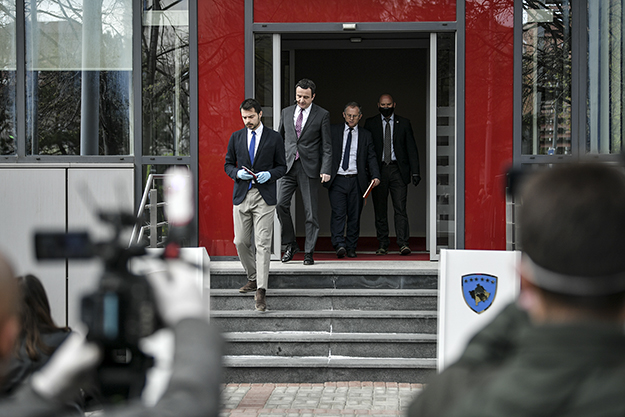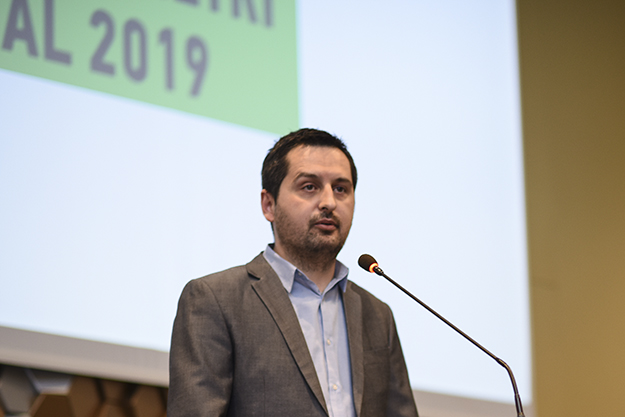A few days after the government introduced the initial measures to prevent the COVID-19 outbreak, Albert Iriqi was concerned about the economic hardship that would follow. For years he has provided for his family by working as a waiter, but the restaurant where he works closed after the first cases of COVID-19 infections were reported in Kosovo — as did all cafés and public spaces.
He was slightly relieved when he received his full wage for the month of March, but he had his eye on April. He needed income for food, as well as to pay his monthly loan installment.
“I dare not think what tomorrow holds,” the 25-year-old said to himself at the beginning of the outbreak of the pandemic in Kosovo. He says that he and his father are the only ones who have jobs in their family of seven.
Berat Rexhepaj, owner of a café in Skënderaj, also has cause for concern. Although he feared the virus and agreed with the government’s decision to close cafés, he was also left with some unanswered questions: When would the cafés reopen? How was he supposed to provide for his family, or pay his waiters, his rent and his loan installment?
Both say that from the beginning, they assumed that it was possible that they would not return to work throughout April. But now that April is ending, it’s likely that cafés will be closed in May as well, meaning that they will be without their daily turnover.
What now?
Since certain economic sectors were closed, the government provided answers bit by bit to Albert, Berat and many others that have been directly affected by the limitation of activities during the pandemic.
As the lockdown began, it became clear from the government decisions and ministry directives that some businesses — especially those in the gastronomy sector — would not open until COVID-19 was no longer among Kosovars. The Office of the Prime Minister told K2.0 that businesses must pay their workers for another 45 days after March 13 (the day when bars, restaurants and cafés were closed) because their absences were justified.
The Central Bank of Kosovo made a decision that ordered commercial banks to suspend loan payments at least until the end of April for citizens who face financial difficulties as a result of the limitations imposed by the government — but the banks themselves decide who is eligible for this.
More answers for the concerns of Albert, Berat and thousands of other Kosovars were provided through the approved Emergency Fiscal Package.

On March 30, the Government of Kosovo approved an emergency package presented by the Ministry of Finance and Transfers. Photo courtesy of the Prime Minister’s Office.
When outgoing prime minister Albin Kurti presented the package, he said among other things, “we are convinced that through this emergency package we will not only replenish our public health, but also our economic health.” Moreover, he said that the package does not have any long-term policies, adding that later on a second package will be created for “economic recovery.”
K2.0 spoke about the emergency package with Artan Mustafa, researcher and university lecturer on social policies and political sociology, and Ahmet Rushiti, manager of the project for political accountability at the Kosova Democratic Institute (KDI).
Are citizens protected from poverty?
With a budget of around 180 million euros, 15 measures make up the government infusion, through which the country’s economic health will initially be treated.
Listing the objectives of the Package, Kurti mentioned financial aid for people in poverty; aid for businesses so that their employees aren’t left without income, so that they can continue to operate during and after the pandemic; aid for municipalities and public enterprises; as well as for minorities.
As part of these measures, families who live in difficult economic conditions and receive social assistance from the state would get double the amount they normally do for the months of March, April and May.
Based on data provided by the Kosovo Agency of Statistics (KAS) from the end of 2019, in Kosovo there are over 24,000 families with approximately 99,000 people in total who receive social assistance, 7% of the population.The monthly sum that they receive differs, from 50 to 150 euros, depending on the number of family members. Only families with 15 or more members are eligible to receive 150 euros — that is around 33 cents per member per day.
According to Mustafa, governments in Kosovo have continuously failed to protect citizens from poverty.
To make matters worse, it was reported that the need for food aid has increased during this period. In April alone, in the biggest municipality in the country, Prishtina, around 500 families sought food aid, raising the official number from 1,600 families “in need of food” within this region.
People who do not receive social assistance from the state budget and are registered as unemployed are eligible to receive a monthly sum of 130 euros for April, May and June.The T7 TV channel reported that over 16,000 people have applied to benefit from this measure.
According to Mustafa, governments in Kosovo have continuously failed to protect citizens from poverty.The same can be said for the new government during the pandemic. For him, the starting point of this failure is the way the governments have conceived of poverty and how to prevent it.
He says that the method used for the measurement of poverty in Kosovo is no longer used in other European countries.“In European countries, the level of poverty is based on surveys pertaining to family income, while in Kosovo it is based on the cost of the basic consumption of food,” he says.
According to him, this methodology was pushed forward by the World Bank and does not aim to protect citizens from poverty, but to reduce expenditure.For Mustafa, it is strange that the current government has not taken any measures to change this approach, although it has continuously claimed that it will push forward leftist policies that ensure welfare for citizens, especially vulnerable groups.

University lecturer Artan Mustafa says that the level of poverty in Kosovo is determined through methods that aim to reduce expenditure, rather than provide welfare to vulnerable groups. Photo from the archive: Atdhe Mulla / K2.0.
He says that if the level of poverty were to be determined through family income, social assistance would be increased because income for the other parts of Kosovar society has increased over the years.In that sense, according to Mustafa, social assistance payments would be around 300 euros per month in normal circumstances where there are no emergency measures, such as the current ones due to the pandemic.
“The social assistance payments are already low, but even if they are doubled, they would still be insufficient,” he says.“Also, let’s not forget that the eligibility criteria [for this scheme] excludes many families — for example ones who have more chickens or a TV — which should be protected from poverty.”
According to him, other factors that make the doubling of social assistance insufficient are the increase of food prices during the pandemic, as well as the limitation of certain public services such as public transportation and healthcare. Mustafa believes that these limitations mostly affect families that receive social assistance.
KAS data also shows that the price of bread has increased in March compared to February, as have the price of water, grains, cheese, salt, meat, fruit, sugar and other basic foods.Increases have also been noted in the prices of medical products, electrical energy, gas and fuel, as well as merchandise and services for regular maintenance of the household economy; on the other hand, the prices of oil and transportation services have decreased.
According to Ahmet Rushiti, in this aspect, municipalities can also help citizens.“Some of them have already allocated budgets.The sum of 10 million euros [allocated for municipalities through the Package] could also help,” he says.
What about the workers?
The Package also envisions the provision of aid for employees like Albert — 41 million euros have been allocated to pay the minimum wage of 170 euros in April and May for employees of businesses that have been directly affected as a consequence of the pandemic.
Ahmet Rushiti of KDI says that the decision was welcomed, but he does have some objections.
“The criteria are somewhat complicated, but we must keep in mind that the situation is also complicated,” he says. Nevertheless, “institutions should simplify the application procedure.”
According to him, the Package as well as other government decisions during the pandemic have included lots of text and have not been explained properly.“These measures could have been explained visually. I saw that the municipalities of Prizren and Prishtina did this, and they were explained quite well,” said Rushiti.

Ahmet Rushiti, manager of the project for political accountability at KDI, says that institutions should find ways to simplify application procedures for assistance from the Emergency Fiscal Package. Photo courtesy of Ahmet Rushiti.
Regarding the allocated sum, for Rushiti it is important that workers who have been affected by the emergency measures have been secured minimum wages at the least.“This measure will help businesses and workers,” he says.
But if the situation continues for many more months, he says that the Package as a whole will not suffice.“It would be ideal if the sum was bigger, but it’s clear that it is an emergency situation and that the wages [of these workers] cannot be covered in full,” he says.
According to Rushiti, one of the reasons why the budget is not bigger could be that there are not enough state funds.
“We must keep in mind that the pandemic support measures have come at a time when the state was due to raise funds,” he says. “Most taxes of the first quarter are paid by businesses on April 15, however, due to the decision to postpone the deadline for paying taxes, the state has less funds at its disposal.”
This measure was welcomed by Mustafa as well, especially considering the number of workers that the government has included as beneficiaries.“Up to 120,000 workers can benefit from this measure according to the government estimates — this is a good number,” he says. According to recent data, around 63,000 workers have applied to benefit from this measure.
Rushiti says that the government's decision to pay pension contributions eases the burden on businesses and fulfills a basic right of every worker.
However, he does not believe that the minimum wage is sufficient.“The minimum wage in Kosovo is 170 euros. We must keep in mind that it was approved in 2011 and that it hasn’t changed since then, while today we are in 2020 and the standard of living has increased — which makes me think that this sum is too low,” he says.
Additionally, he expresses doubts over the application process, noting that employers must apply for their employees, and also that they must provide proof that their economic activity has been affected by the limitation measures that the government has taken due to the pandemic.
“It seems the criteria are there to exclude people, rather than help them,” he says, adding that it is unacceptable that the payments for employees have been left to the will of the employers, “since they [employers] have to declare and provide data on the employee’s behalf,” he believes that this only complicates the application procedure.
Meanwhile for Rushiti, this measure has another valuable point in the fact that the government has decided to pay pension contributions, because he believes that this eases the burden on businesses, and most importantly, fulfills a basic right of every worker.
What about informal workers and the unemployed?
The Package determines that people who have lost their jobs after the implementation of the measures against the COVID-19 outbreak can apply to receive 130 euros per month for April, May and June.To apply, they must prove that they were discharged from employment “after the activity of the enterprise was reduced due to the situation created by the pandemic.” The application form must be submitted to the Tax Administration of Kosovo and the former employer.
For Mustafa, this is a concern because he believes that there is a “criterion of exclusion,” noting that when someone is discharged, it is highly likely that their relationship with their employer is not good, so this can create situations where many of the workers who have lost their jobs won’t receive the money that they are entitled to.
Moreover, he believes that it is difficult to fill in the documents required to prove that the discharge happened as a result of the situation created by the pandemic. It is likely that some former employers do not have the will to help out their former employees by filling out the documents.
Another measure targets commercial companies who have registered their employees with one year contracts during the pandemic period; those employees will receive 130 euros for the next two months after the registration is “a very good measure” according to Mustafa.He believes that this is the first step of a government that is trying to formalize the labor market.
However, regarding this point, he criticizes the government for the 6 million euro budget, which he believes is insufficient.“According to data, such as those provided by the World Bank, in Kosovo around 35% of the labor market is informal, which means that there are over 150,000 informal workers,” he says, adding that this budget excludes many.
Mustafa sees the package as "parsimonious, with several criteria that exclude many people."
Mustafa also thinks that the estimated number of beneficiaries is low, with regard to the measure to ensure the financial liquidity of micro-enterprises and self-employed individuals through loans.
As part of this measure,15 million euros have been allocated so that through programs of the Kosovo Credit Guarantee Fund, self-employed individuals and enterprises with 10 or less employees can get loans up to 10,000 euros.This means that there can be more than 1,500 beneficiaries, a low number to begin with according to Mustafa.
In general, Mustafa sees the Package as “parsimonious, with several criteria that exclude many people,” because, according to him, the small sums that have been allocated resemble those allocated in conservative neoliberal policies that strive to reduce expenditure, rather than protect citizens during an emergency.
For Rushiti, it is important to understand that we are in an emergency situation, and that this might have pushed the government to limit itself to these measures.He insists that it is important “to preserve the financial stability of the country and to not spend uncontrollably, because the state could go bankrupt.
K2.0 contacted the government for an interview, but received no response before the article was published.K
Feature image: Atdhe Mulla / K2.0.
The article is part of the Human Rightivism project, which is funded by the Swedish International Development Cooperation Agency (SIDA) through its Human Rightivism Program. The author’s views expressed in this publication do not necessarily reflect the views of the Swedish International Development Cooperation Agency (SIDA).




